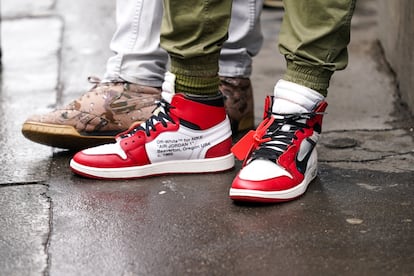From everyday item to high-end collectible: Is the luxury sneaker bubble about to burst?
Scammers, celebrities, resellers and big companies have turned sneakers into an object not only of devotion, but of endless controversy

In early August of 2022, the Oregon District Attorney’s Office charged Michael Malekzadeh with orchestrating a scam of more than $80 million. It looked like another pyramid scam (a hefty one, for sure) except for the nature of the fraud: for years, Malekzadeh had been the boss of Zadeh Kicks, a company dedicated to the reselling of sneakers, which many bought unaware that they were taking a bait.
Malekzadeh’s modus operandi was quite rudimentary; what makes his case special is the product that he offered, one of the great obsessions of recent times, something for which teenagers have stood in endless lines and for which nowadays many pay unthinkable amounts: sneakers. At Zadeh Kicks, you paid for a pair of highly sought-after, hard to get sneakers, and they arrived quickly. The satisfied customer returned, and this went on until one fine day they placed a larger order: then, the long-awaited shoes never reached their destination. A textbook Ponzi scheme. The police arrested the scammer and confiscated 60,000 pairs of various limited-edition sneakers from brands like Adidas and Nike. They will be auctioned in an attempt to compensate the thousands of affected people, but experts have already warned that, no matter how much is collected, it will not be enough.
The world of sneakers is constantly generating the headlines of a booming business. Recently, Kanye West accused Adidas of copying styles from Yeezy, the brand on which the rapper has collaborated since 2015 with the German manufacturer and which has transformed the market with its influential designs. It is a true success story: Yeezy was valued at $3 to $5 billion by UBS Group AG. But now, West is threatening to open his own stores without the company. Meanwhile, in Oregon, the executives of Nike are watching the world go crazy for the models designed by another rapper, Travis Scott, and other cult sneakers such as the Jordan, the SB, or the stratospheric figures reached by limited editions of the ill-fated Virgil Abloh shoes. Sneakers used to be something common, until a bunch of collectors and wealthy customers decided to change this.
Is the party over?
The future may not look so good. First, because of saturation, the very cyclical nature of fashion. “It is predicted that by 2030, the sneaker resale market will reach $30 billion. But what happens if the perceived value of rare sneakers disappears?” asks Kieran Coyle, from Sole Supplier, one of the greatest experts in the sector in the United Kingdom. Lois Sakany, a journalist from Business Insider magazine, warns of a loss of hype. “A correction of sorts is happening in the sneaker resale market. Hot sneakers aren’t increasing in value like they did a year ago. And there’s a marked shift in fashion trends — chunky loafers and boots are back,” she stated.
Other leaders in the sector, such as youtuber JumperMan Kris, predict a drop in prices because the recession will especially affect the sneakers, which are already considered luxury products. Because this thriving market also has an intrinsic problem: it is difficult to control who buys the shoes at their original price and then resells them for several times what they paid. Kieran Coyle warns that the moment the big companies attack the resale, the market will collapse. In the meantime, “unless the big players do something to combat the resale market, as Nike is with the counterfeit market, it will continue to thrive.”
Just a few days ago, Patta, the legendary Amsterdam store, put on sale its white Air Max 1, the fifth model of its collaboration with Nike. As usual, the site crashed, and just a few minutes later dozens of pairs appeared in the usual resale places, costing two or three times the asking price. For sneakerheads (that is, serious collectors), the end of the resale agony would be great news, as it would allow much simpler access to the most sought-after models. Currently, the most impatient ones can take advantage of tools like the aforementioned Sole Savy, a paid app that notifies its subscribers of restocks, deadstocks (sneakers that are no longer produced but suddenly reappear somewhere) or unexpected offers. An app, initially, designed for fans of the sneaker phenomenon; not for the resale mafias.
Because, like any booming trend, the sneaker trend may have reached its peak: bots designed to buy sneakers faster than humans; the frenzy created by each launch; the risk when there are physical lines involved (there have been riots in cities like Chicago and Los Angeles); the frantic calendar of novelties and the arrival to the market of young people from all over Asia and the Middle East with fresh money and knowledge. A true sneaker bubble.
For now, sneakers have become, for auction houses like Sotheby’s, categories like wines or Hermès bags: new niches in which to invest. But, for the everyday customer, the sector is practically a nightmare. It is quite possible to pick up a limited-edition handbag from a major luxury brand at an authorized store, but if you want a pair of Jordan Off-Whites, get ready to suffer, hold on to your wallet and pray that you don’t get scammed.
Tu suscripción se está usando en otro dispositivo
¿Quieres añadir otro usuario a tu suscripción?
Si continúas leyendo en este dispositivo, no se podrá leer en el otro.
FlechaTu suscripción se está usando en otro dispositivo y solo puedes acceder a EL PAÍS desde un dispositivo a la vez.
Si quieres compartir tu cuenta, cambia tu suscripción a la modalidad Premium, así podrás añadir otro usuario. Cada uno accederá con su propia cuenta de email, lo que os permitirá personalizar vuestra experiencia en EL PAÍS.
¿Tienes una suscripción de empresa? Accede aquí para contratar más cuentas.
En el caso de no saber quién está usando tu cuenta, te recomendamos cambiar tu contraseña aquí.
Si decides continuar compartiendo tu cuenta, este mensaje se mostrará en tu dispositivo y en el de la otra persona que está usando tu cuenta de forma indefinida, afectando a tu experiencia de lectura. Puedes consultar aquí los términos y condiciones de la suscripción digital.









































